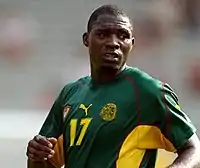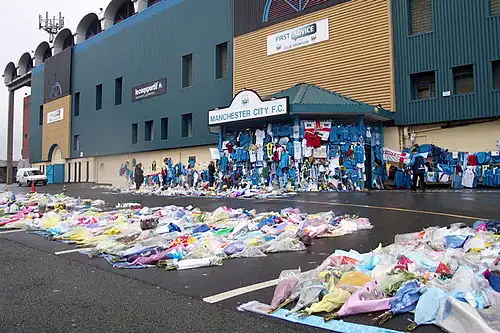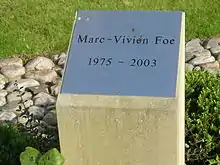Marc-Vivien Foé
Marc-Vivien Foé (1 May 1975 – 26 June 2003) was a Cameroonian professional footballer, who played as a defensive midfielder for both club and country.
 Foé playing for Cameroon in 2003 | |||
| Personal information | |||
|---|---|---|---|
| Full name | Marc-Vivien Foé | ||
| Date of birth | 1 May 1975 | ||
| Place of birth | Yaoundé, Cameroon | ||
| Date of death | 26 June 2003 (aged 28) | ||
| Place of death | Lyon, France | ||
| Height | 1.88 m (6 ft 2 in) | ||
| Position(s) | Midfielder | ||
| Youth career | |||
| 1991–1992 | Union de Garoua | ||
| 1992–1994 | Fogape Yaoundé | ||
| Senior career* | |||
| Years | Team | Apps | (Gls) |
| 1994 | Canon Yaoundé | ||
| 1994–1999 | Lens | 85 | (11) |
| 1999–2000 | West Ham United | 38 | (1) |
| 2000–2003 | Lyon | 43 | (3) |
| 2002–2003 | → Manchester City (loan) | 35 | (9) |
| Total | 201 | (24) | |
| International career | |||
| 1993 | Cameroon U20 | 3 | (1) |
| 1993–2003 | Cameroon | 62 | (8) |
| *Club domestic league appearances and goals | |||
Having initially played for Canon Yaoundé, Foé went on to play professionally in Ligue 1 and the Premier League with Lens, West Ham United, Lyon and Manchester City. On 26 June 2003, Foé died suddenly during an international match for Cameroon, an event which shocked the football community worldwide.[1] The death was later ruled to be due to hypertrophic cardiomyopathy. He was capped 62 times by his nation and had scored 8 goals.
He was posthumously decorated with the Commander of the National Order of Valour and had his shirt numbers 23 and 17 retired by Manchester City and Lens, respectively.
Club career
Foé was born on 1 May 1975 in Yaoundé. He started as a junior with Elite Two side Union de Garoua.[2] Moving to Canon Yaoundé, one of the biggest clubs in Cameroon, he won the Cameroonian Cup in 1993.[3]
After turning down Auxerre for a trainee position, he signed for another French club, RC Lens of Ligue 1.[4] His debut on 13 August 1994 was a 2–1 win against Montpellier.[4] In five seasons at Lens, he won the 1998 French league title.
In 1998, he was targeted by Manchester United, but Lens turned down a £3 million offer for him.[5] Further negotiations between the clubs were curtailed abruptly after he broke a leg at Cameroon's pre-World Cup training camp,[6] and subsequently missed the whole of the 1998 World Cup.
Shortly after his recovery, he moved to English Premier League club West Ham United, for a club record fee of £4.2 million in January 1999.[7] He played 38 league matches for West Ham, scoring one goal against Sheffield Wednesday.[8][9] He also scored a goal in West Ham's 3–1 win against NK Osijek in the UEFA Cup.[10]
In May 2000, he moved back to France, joining Lyon on a £6 million transfer.[11] He missed much of the season after he developed symptoms of malaria.[12] After recovery, he won the Coupe de la Ligue in 2001, and the Division 1 league title a year later.[13]
Foé then returned to the English Premier League, loaned to Manchester City in the 2002–03 season for £550,000.[14] His debut on the opening day of the season was a 3–0 loss to Leeds United. Foé was a first team regular for Kevin Keegan's team, starting 38 of 41 matches. His first goal for the club came against Sunderland at the Stadium of Light on 9 December 2002,[15] and he scored five more goals in the next month. His second goal in a 3–0 victory against Sunderland on 21 April 2003 was the club's final goal at their old Maine Road stadium.[16]
International career
Foé began representing Cameroon at under-20s when he was called up to the squad of 18 players for the 1993 FIFA World Youth Championship in Australia, under the management of Jean Manga-Onguéné.[17] He played in all of their three group stage matches, scoring one goal in a 3–2 defeat to Colombia in their second match on 8 March 1993, as Cameroon were eventually eliminated from the competition after finishing third.[17] Foé later made his senior debut against Mexico on 22 September 1993 at the Memorial Coliseum, a match which Cameroon lost 1–0.[18][19]
The following year, he was included in the Cameroon squad for the 1994 World Cup, starting all three of their matches.[20] Team members had been in various financial and disciplinary disputes with the Cameroon Football Association,[21] and the squad was a shadow of the one which had famously reached the quarter-finals of the World Cup in 1990.[22] Cameroon mustered just one point from three matches, and finished with an embarrassing 6–1 defeat to Russia.[23] However, Foé's consistently strong performances as a defensive midfielder (including a goal assist)[24] prompted interest from European clubs.
He was in the Cameroon squad in the 2002 World Cup. As in 1994, he played in all of Cameroon's matches. Though the team performed better than in 1994, they were again eliminated at the group stage, having beaten Saudi Arabia, drawn with Ireland and lost to Germany.[22][8]
Death

Foé was part of the Cameroon squad for the 2003 FIFA Confederations Cup. He played in wins against Brazil and Turkey, and was rested for the match against the United States, with Cameroon having already qualified.
.JPG.webp)
On 26 June 2003, Cameroon faced Colombia in the semi-final, held at the Stade de Gerland in Lyon, France. In the 72nd minute of the match Foé collapsed in the centre circle[25] with no other players near him.[26] After attempts to resuscitate him on the pitch, he was stretchered off the field, where he received mouth-to-mouth resuscitation and oxygen. Medics spent 45 minutes attempting to restart his heart, and although he was still alive upon arrival at the stadium's medical centre, he died shortly afterwards.[25] A first autopsy did not determine an exact cause of death, but a second autopsy concluded that Foé's death was heart-related as it discovered evidence of hypertrophic cardiomyopathy,[27] a hereditary condition known to increase the risk of sudden death during physical exercise.
Foé's widow Marie-Louise stated that he had been ill with gastric problems and dysentery before his final match, but he was adamant to play in his adopted hometown of Lyon. Cameroon manager Winfried Schäfer wanted to substitute him minutes before his collapse, observing that the player seemed fatigued, but he signalled that he wanted to continue.[28]
Personal life
Foé was a practising Roman Catholic and donated money to charity regularly.[29] He held Cameroonian and French nationalities.[30]
Tributes
Foé's death caused a profound shock. Numerous tributes to his joyous personality and infectious humour were expressed in the media. French national team player Thierry Henry and other French players pointed to the sky in tribute to Foé after Henry had opened the scoring against Turkey in their Confederations Cup semi-final that evening.[31]

It was suggested that the Confederations Cup and the Stade Gerland could have been renamed after him, and Manchester City manager Kevin Keegan announced that the club would no longer use the number 23 shirt Foé wore during his successful season there. At Manchester City's former ground, Maine Road, there is a small memorial to him in the stadium's memorial garden, and on the walls of the players' tunnel are plaques paid for by supporters, with their names, dubbed the Walk of Pride. The first plaque on the wall is for Marc and reads "Marc Vivien Foé – 1975–2003". His first club, Lens, gave his name to an avenue near the Stade Félix Bollaert. Foé was given a state funeral in Cameroon.[1]
Similar to Manchester City, Lens decided to withdraw the number 17 shirt that Foé wore for five years. Lyon also decided to withdraw the number 17 shirt that Foé also wore a year before during the time which he played at the Stade de Gerland with the Lyon team. People in Lyon were shocked as he had received a warm welcome on his return to the stadium. However, when fellow Cameroonian Jean II Makoun was transferred to Lyon, Makoun took up the number 17 shirt, explaining that he wore the number: "In memory of Marc, for me and for the whole Cameroon, this will be for something."
Prior to the kick-off of the 2009 FIFA Confederations Cup final between the United States and Brazil, his son, then fourteen years old, gave a brief speech in memory of his father.
Career statistics
Club
| Club | Season | League | National Cup | League Cup | Continental | Total | ||||||
|---|---|---|---|---|---|---|---|---|---|---|---|---|
| Division | Apps | Goals | Apps | Goals | Apps | Goals | Apps | Goals | Apps | Goals | ||
| Lens | 1994–95 | Division 1 | 15 | 3 | 15 | 3 | ||||||
| 1995–96 | 19 | 2 | 19 | 2 | ||||||||
| 1996–97 | 28 | 2 | 28 | 2 | ||||||||
| 1997–98 | 18 | 2 | 0 | 0 | 18 | 2 | ||||||
| 1998–99 | 5 | 2 | 1 | 0 | 6 | 2 | ||||||
| Total | 85 | 11 | 1 | 0 | 86 | 11 | ||||||
| West Ham United | 1998–99 | Premier League | 13 | 0 | 0 | 0 | 0 | 0 | 0 | 0 | 13 | 0 |
| 1999–2000 | 25 | 1 | 1 | 0 | 3 | 0 | 3 | 1 | 32 | 2 | ||
| Total | 38 | 1 | 1 | 0 | 3 | 0 | 3 | 1 | 45 | 2 | ||
| Lyon | 2000–01 | Division 1 | 25 | 1 | 3 | 0 | 3 | 0 | 8 | 1 | 39 | 2 |
| 2001–02 | 18 | 2 | 0 | 0 | 0 | 0 | 8 | 0 | 26 | 2 | ||
| Total | 43 | 3 | 3 | 0 | 3 | 0 | 16 | 1 | 65 | 4 | ||
| Manchester City | 2002–03 | Premier League | 35 | 9 | 1 | 0 | 2 | 0 | 0 | 0 | 38 | 9 |
| Career total | 201 | 24 | 5 | 0 | 8 | 0 | 20 | 2 | 234 | 26 | ||
International
| National team | Year | Apps | Goals |
|---|---|---|---|
| Cameroon | 1993 | 2 | 0 |
| 1994 | 6 | 0 | |
| 1995 | 2 | 1 | |
| 1996 | 4 | 0 | |
| 1997 | 6 | 0 | |
| 1998 | 5 | 0 | |
| 1999 | 2 | 0 | |
| 2000 | 8 | 3 | |
| 2001 | 9 | 2 | |
| 2002 | 14 | 2 | |
| 2003 | 4 | 0 | |
| Total | 62 | 8 | |
International goals
- Cameroon score listed first, score column indicates score after each Foé goal.[33]
| No. | Date | Venue | Cap | Opponent | Score | Result | Competition |
|---|---|---|---|---|---|---|---|
| 1 | 24 December 1995 | Stade Ahmadou Ahidjo, Yaoundé, Cameroon | 10 | 1–0 | 1–0 | Friendly | |
| 2 | 22 January 2000 | Accra Sports Stadium, Accra, Ghana | 28 | 1–0 | 1–1 | 2000 African Cup of Nations | |
| 3 | 6 February 2000 | 31 | 2–0 | 2–1 | |||
| 4 | 19 April 2000 | Stade Ahmadou Ahidjo, Yaoundé, Cameroon | 34 | 2–0 | 3–0 | 2002 FIFA World Cup qualification | |
| 5 | 1 July 2001 | 42 | 2–0 | 2–0 | |||
| 6 | 14 July 2001 | Independence Stadium, Lusaka, Zambia | 43 | 1–0 | 2–2 | ||
| 7 | 7 January 2002 | Stade du 4 Août, Ouagadougou, Burkina Faso | 45 | 1–0 | 3–1 | Friendly | |
| 8 | 7 February 2002 | Stade du 26 Mars, Bamako, Mali | 51 | 3–0 | 3–0 | 2002 African Cup of Nations |
Honours
- Canon Yaoundé
- Cameroonian Cup: 1993[3]
- Lens
- West Ham United
- Lyon
- Cameroon
Individual
- FIFA Confederations Cup Bronze Ball: 2003[41]
References
- Martin Etonge (7 July 2003). "State funeral for Foe". BBC Sport. Retrieved 16 December 2007.
- "Thousands follow Foe to burial". Rediff. 8 July 2003. Retrieved 16 December 2007.
- "La fiche de Marc-Vivien Foé". L'Équipe (in French). Retrieved 16 December 2007.
- "La vie de Marc Vivien Foé". Bonaberi. Retrieved 16 December 2007.
- Metcalf, Rupert; Nixon, Alan (19 May 1998). "Football: Lens want United to dig deep for Foe". The Independent. London. Retrieved 4 January 2011.
- Metcalf, Rupert (25 May 1998). "Foe's World Cup dream ends with broken leg". The Independent. Retrieved 29 June 2016.
- Keogh, Frank (27 June 2003). "Fans unite in Foe grief". BBC Sport. Retrieved 16 December 2007.
- Glanville, Brian (28 June 2003). "Marc-Vivien Foé". The Guardian. London. Retrieved 4 January 2011.
- Rowbottom, Mike (21 November 1999). "Wednesday undone by Di Canio". The Independent. London. Retrieved 29 December 2009.
- Isaacs, Mark (30 September 1999). "Hammers ease ahead on cruise control". The Guardian. London. Retrieved 29 December 2009.
- "Summer signings". BBC Sport. 12 August 2000. Retrieved 17 March 2012.
- "Marc-Vivien Foe". ESPN. Retrieved 3 October 2008.
- "Former clubs to honor fallen player". ESPN FC. 27 June 2003. Retrieved 29 June 2016.
- "Foe signs for City". Manchester Evening News. 17 February 2007. Retrieved 16 December 2007.
- "Sunderland 0 Manchester City 3". Manchester Evening News. Retrieved 16 December 2007.
- "Foe: Career on two continents". BBC Sport. 26 June 2003. Retrieved 16 December 2007.
- "Facts and figures" (PDF). FIFA. pp. 122, 138, 142. Archived from the original (PDF) on 15 February 2010. Retrieved 29 June 2016.
- "Marc-Vivien Foe Factbox". CNN. Retrieved 16 December 2007.
- Cart, Julie (23 September 1993). "Mexico's reserve team easily beats Cameroon". Los Angeles Times. Retrieved 29 June 2016.
- "World Cup 1994". Rec.Sport.Soccer Statistics Foundation. Retrieved 16 December 2007.
- Glanville, Brian (2005). The Story of the World Cup. London: Faber and Faber. p. 343. ISBN 0-571-22944-1.
- Brian Glanville (28 June 2003). "Marc-Vivien Foé". The Guardian. London. Retrieved 3 October 2008.
- Glanville, The Story of the World Cup, p 344.
- "Planet World Cup – 1994 – Group B – Sweden v Cameroon". Planet World Cup.
- "Cameroon star Foe dies". BBC Sport. 26 June 2003. Retrieved 5 January 2008.
- "Footballer Foe dies during game". The Guardian. London. 26 June 2003. Retrieved 5 January 2008.
- "Autopsy reveals Foe died of heart problem". CNN. Retrieved 5 January 2008.
- "Foe ill before match". BBC Sport. 28 June 2003. Retrieved 10 April 2016.
- "Fans unite in Foe grief". BBC News. 27 June 2003. Retrieved 17 September 2017.
- "Joueur".
- "France 3–2 Turkey". BBC Sport. 26 June 2003. Retrieved 26 September 2009.
- Single source here, if player is inactive. If player has not retired, move source next to "Updated" template.
- Mamrud, Roberto (30 October 2014). "Marc-Vivien Foé – International appearances". Rec.Sport.Soccer Statistics Foundation. Retrieved 28 June 2016.
- Villepreux, Olivier (11 May 1998). "Les sang et or champions sur le fil devant Metz. Au bonheur de Lens". Libération (in French). Retrieved 29 June 2016.
- Haylett, Trevor (11 August 1999). "West Ham unable to master a meaty Metz challenge". The Irish Times. Retrieved 29 June 2016.
- Tongue, Steve (25 August 1999). "Hammers storm Metz citadel". The Independent. Retrieved 29 June 2016.
- Berlin, Peter (6 May 2002). "Lyon catches Lens to grab French title". The New York Times. Retrieved 29 June 2016.
- "Ambitious Lyon clinches first trophy in 28 years". Hürriyet Daily News. Reuters. 7 May 2001. Retrieved 29 June 2016.
- "Cameroon victorious on penalty kicks". ESPN. Reuters. 13 February 2000. Retrieved 29 June 2016.
- Copnall, James (11 February 2002). "Cameroon are hot from the spot". The Guardian. Retrieved 29 June 2016.
- "FIFA Confederations Cup official awards". Fédération Internationale de Football Association. 29 June 2003. Archived from the original on 4 July 2003. Retrieved 29 June 2016.
External links
- Marc-Vivien Foé at Soccerbase
- Marc-Vivien Foé at National-Football-Teams.com
- Marc-Vivien Foé international statistics at 11v11.com